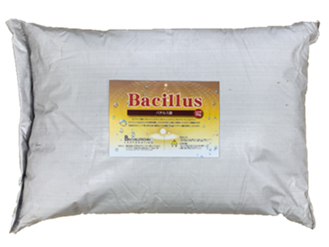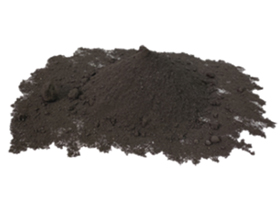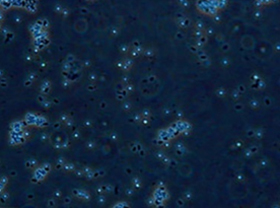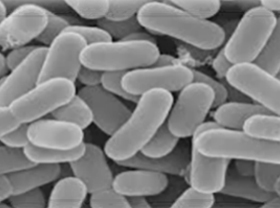TOC·TN·TP Load Reducer & Odor Eliminator
Nitrogen and Phosphorus Removal and Odor Suppression
Bacillus subtilis
 (Powder 25kg bag)
(Powder 25kg bag)
It is a very common soil bacterium found in soil and is abundant in our surroundings. It is found in black tea, oolong tea, natto (fermented soybeans), miso (fermented soybean paste), pickles, and Chinese herbal medicines. It is also present as part of activated sludge bacteria in existing wastewater treatment facilities. Microbiologically, they are called spore-forming bacteria, which grow when nutritional conditions are favorable, and form spores and enter a dormant state when nutritional conditions become poor. During the spore state the spores are able to defend themselves against a variety of adverse conditions such as high pH, high temperature, low temperature, and high salt concentration, without perishing.
Bacillus bacteria are fed into the existing aeration tank only once and are propagated by controlling the air volume and feeding a small amount of activator. Bacillus coexists with existing activated sludge bacteria, and the following effects can be achieved if present at 1~10% of the activated sludge bacteria. Improvement and enhancement of processing function It secretes enzymes during the growth process, which break down proteins, fats, cellulose, and other substances, and breaks down starch into glucose. This leads to an improvement in the quality of treated water. In addition, the secretion of antibiotics kills E. coli and other bacteria. Absorption・ingestion・decomposition of odor components / nitrogen removal No bad odor is generated due to direct ingestion of nitrogen and sulfur, which are the cause of bad odor (nitrogen removal). Since there are many bacillus bacteria in the excess sludge and most of the undigested materials in the sludge have been decomposed, odor in the dewatered cake and dehydrator room is also suppressed. Tolerance to load fluctuations In most cases, activated sludge bacteria deteriorate significantly under unfavorable conditions, requiring as much as three months to recover. Bacillus spores form to protect themselves under unfavorable conditions and germinate and take an active role as soon as conditions become favorable again. Improvement of solid-liquid separation and adsorption・removal of phosphorus Bacillus bacteria secrete a viscous substance during their growth process, which causes them to clump together and adsorb suspended solids to form large flocs. This results in faster sludge sedimentation and easier solid-liquid separation in the sedimentation tank. In addition, the sludge adsorbs more phosphorus due to the secretion of viscous substances.

Bacillus powder

400x microscope

electron microscope
Our Bacillus subtilis is made from pure cultures of Bacillus subtilis, Bacillus pumilus, Bacillus thuringiensis, and Bacillus megaterium, which are then attached to bamboo charcoal and we use Bacillus subtilis bacteria, which has a high ability to decompose proteins, carbohydrates, lipids, and other pollutants in organic wastewater.